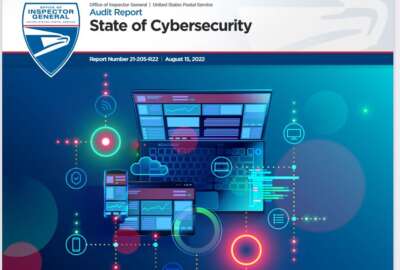
Postal Service receives cybersecurity report card with mixed grades
In today's Federal Newscast: The Postal Service received mixed-grades on a cybersecurity report card. HUD and its employees' union are not seeing eye-to-eye on...
Best listening experience is on Chrome, Firefox or Safari. Subscribe to Federal Drive’s daily audio interviews on Apple Podcasts or PodcastOne.
- The Postal Service’s latest cybersecurity report card is a mixed bag. The Postal Service operates one of the world’s largest networks, crawling with more than 1.1 million devices and 92.5 petabytes of data. A new USPS inspector general audit said the Postal Service is doing a better job of securing that network since a 2014 data breach. But the IG also said USPS needs stronger centralized oversight of its cybersecurity practices. The partially redacted report found instances where the Postal Service didn’t enforce cybersecurity policies, like ensuring application owners fix security deficiencies. USPS agreed with recommendations to strengthen cybersecurity compliance measures.
- For a second time, the Pentagon has denied a request to deploy the National Guard to help deal with busloads of migrants sent from two southwestern states. D.C. Mayor Muriel Bowser said she would have deployed the National Guard long ago to care for the thousands of people who have been bussed in by the governors of Arizona and Texas. But since D.C. is not a state, the deployment decision belongs to the secretary of the Army. To make a point about their disagreement with President Biden’s border policies, Texas has bussed about 7,000 undocumented immigrants to D.C. Arizona has sent about 1,500. (Federal News Network)
- The Defense Department shelled out more than $100 million for ambulance rides that might not have been necessary. A report from the DoD Inspector General said the Defense Health Agency lacked the proper documentation from providers when paying for some ambulance rides between 2015 and 2020. The inspector general pointed out a number of ambulance rides DoD paid for that were not medical emergencies.
- The Department of Homeland Security wants law enforcement partners to communicate more effectively with each other. At the recent Intelligence Summit, DHS said that it will enhance information sharing efforts by making intelligence available at the lowest classification level possible and emphasized the value of its app, “DHS Intel,” which makes intelligence information available on smartphones. The Intelligence Summit, held for the first time in 15 years, also featured discussions on the importance of protecting privacy, civil rights and civil liberties.
- The union representing employees at the Department of Housing and Urban Development pushed back against the agency’s office reentry policy. The American Federation of Government Employees is seeking a third-party arbitrator after disagreements about returning HUD workers to the office. AFGE and HUD previously agreed to let eligible employees work remotely after getting a manager’s approval. But the union’s HUD chapter said agency leaders preemptively excluded over 90% of the workforce from applying for remote work. HUD returned many teleworking employees to the office in June.
- The Monkeypox vaccine will now be easier to get for those in the military. The Defense Department is increasing its supply of the Monkeypox vaccine, giving service members a better chance of protecting themselves against the disease. At the same time, the Food and Drug Administration is allowing for smaller doses of the vaccine as a way to stretch supplies, helping make the shot more available. The United States already declared Monkeypox a national emergency. There are currently more than 14,000 cases in the nation. DoD is trying to get the vaccine to at-risk service members within two days of request.
- A large professional services contractor is about to get a bit bigger. Consulting firm Guidehouse is buying Grant Thornton’s Public Sector Advisory practice in the most recent merger and acquisition impacting the federal sector. Terms of the acquisition were not disclosed, but it is expected to close later this year. In buying Grant Thornton’s public sector advisory practice, Guidehouse brings on expertise in finance, human-capital management, IT, data analytics and performance management. Grant Thornton’s Public Sector Advisory Practice received more than $69 million in federal contracts in 2021, according to USAspending.gov. The organization’s biggest customers were the departments of Homeland Security, Labor, Defense and Health and Human Services. Guidehouse won more than $695 million in federal contracts last year.
- The Biden administration wants help for how best to measure the economic value that natural resources provide to society and to illustrate how a robust economy depends on a healthy natural environment. To that end, the Office of Management and Budget issued a request for information to better inform the development of governmentwide natural capital accounts and to standardize environmental-economic statistics. The RFI seeks comments about four broad areas including the draft national strategy released last week and statistics or applications to improve decision making. Responses to the RFI are due by October 21.
- The Federal Emergency Management Agency is bringing on a retired Marine to spearhead its disability integration efforts. Sherman Gillums, Jr. is the new director at FEMA’s Office of Disability Integration and Coordination. He will be responsible for ensuring people with disabilities have equitable access to FEMA programs and services. Gillums served for 12 years in the Marine Corps. He was most recently chief strategy and operations officer with the National Alliance on Mental Illness. Gillums also held leadership positions with Paralyzed Veterans of America and AMVETS.
- Lawmakers, unions and advocacy groups are joining forces on the issue of the safety of federal law enforcement officers. Chairwoman Carolyn Maloney of the House Oversight and Reform Committee said she’s worried about violent threats on social media, concerned they might be endangering federal officers. Groups like the Professional Managers Association and the Federal Law Enforcement Officers Association urge Congress to enact legislation to protect the personal information of those federal employees. The issue arose after threats were directed at FBI agents who recently searched Mar-a-Lago.
Copyright © 2025 Federal News Network. All rights reserved. This website is not intended for users located within the European Economic Area.
Peter Musurlian
Peter Musurlian is a producer at Federal News Network.
Follow @PMusurlianWFED
Related Stories
Related Topics




